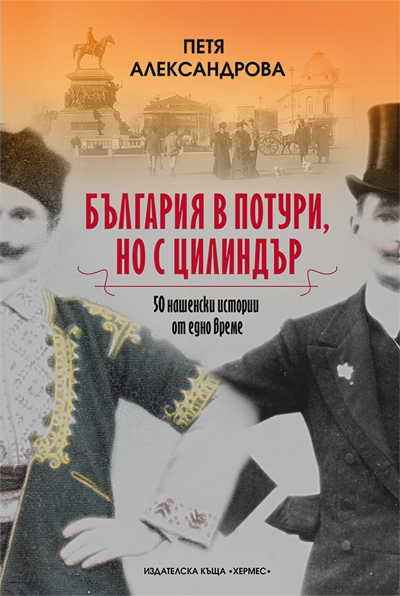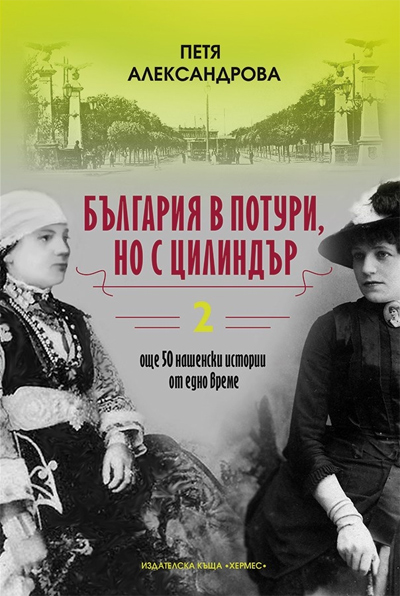 The book „Bulgaria in full-bottomed breeches and a top-hat” by Petya Alexandrova that has just been released on the market is a follow-up of another volume with stories from Bulgaria from the end-19th and the early 20th Century. The new volume offers the same number of stories under the same title. Similar to the first volume the author takes the reader on a journey to the past with erudition and remarkable narrative skills. The title of the volume suggests the process of the European development of Bulgarians as they exited the timelessness of the Ottoman Empire.
The book „Bulgaria in full-bottomed breeches and a top-hat” by Petya Alexandrova that has just been released on the market is a follow-up of another volume with stories from Bulgaria from the end-19th and the early 20th Century. The new volume offers the same number of stories under the same title. Similar to the first volume the author takes the reader on a journey to the past with erudition and remarkable narrative skills. The title of the volume suggests the process of the European development of Bulgarians as they exited the timelessness of the Ottoman Empire.
However, the book has not tried to showcase this development, because the “European” in Bulgaria is a highly controversial notion. One of the stories for example, recounts of the efforts of the government to influence the “independent” Judiciary. The rebellious prosecutor who is finally fired was famous writer Aleko Konstantinov, a world-class satirist. He was fired for not having a certificate from primary school despite his university degree in law.
Another chapter shows how the government compliantly supported the “free market” of sexual services. However, anxious not to tease traditionally minded Bulgarian it introduced a handful of moral restraints that look quite hilarious today – for example, prostitutes were banned from entering the famous Sofia Mineral Bath at the same time with respectable women. In the meantime though the Bulgarian nation developed making progress in economy, culture and education. Great personalities emerged as well, and the author describes them with respect but also with all their ups and downs.
 Why was it important for Petya Alexandrova to write about famous Bulgarians from the 19th and 20th Century?
Why was it important for Petya Alexandrova to write about famous Bulgarians from the 19th and 20th Century?
“I never thought whether it is important or not, I just wrote the way my heart told me”, the writer said in an interview for Radio Bulgaria. “In fact, this is the same manner of writing since I have become a journalist and writer. I was not after any particular originality.”
One of the book’s ideas is to cast light on the Europeanization of Bulgaria at that time. However, there are cases when this process takes the opposite direction or Europeanization assumes grotesque dimensions.
“Well, of course there are such cases. In the book readers can find episodes suggesting that for Bulgarians it was tough to get to grips with change. Other episodes suggest the opposite – that sometimes Bulgarians are keen to be abreast of time, or of technology. At the start of Europeanization however, not everything was alright. Take the example with bicycles in Bulgaria. The first bicycles were imported, and there were Bulgarian mechanics trying to copy them. They did make some sort of bikes but the population was rather hostile to those items. Children met them with cries – like something weird and bizarre. They saw the idea of bikes as quite outlandish: relying on two wheels and trying to outrun others”, Petya Alexandrova went on to say.
Most probably at that time a woman riding a bicycle was likely to hurt her public image. It turns out it was equally risky for men too:
“I have read somewhere that even the monarch Ferdinand bought a bicycle and tried to ride it in the Royal Palace. Even he felt a bit awkward with this means of transportation. And he seems he gave up in the end, because there is no photo with him on a bicycle.”
Here is how the author assesses her own book:
“The book should not be read as serious historical research. It is written with a little bit of humor, a little bit of indulgence, with a feminine look at details and at a few comic situations.”
The book was presented by Rumen Leonidov, a writer and journalist from the Bulgarian National Radio. Apart from its good composition, the nice chatty style and the refined narrative he also pointed to the fact that Petya Alexandrova recounts of persons that we have not scrutinized enough. Leonidov appreciates the way the leaders of the Bulgarian spirit and the brainworkers have been portrayed: „...Great writers, outstanding figures – we can feel that they were the genuine representatives of that time. …Today there is neither respect for writers nor even a café where they could meet as was the case in the past. Today, the artistic elite stands aloof and totally neglected.”
In turn, Petya Alexandrova said that she didn’t find any great secrets in the archives and used diverse sources including memoirs, diaries and letters which are known to specialists. The important point however is how all this is scrutinized: “The truth seems to be in a purely female gift that I have to spot just two lines in a bulk of reading which hold a key to a story. They urge me to read further and tell the story from the viewpoint of curiosity.”
English Daniela Konstantinova
The book "The Sboryanovo Enigma” by Dragomir Bogomilov will be presented this evening at 7:00 pm in the "Sofia" gallery of the Bulgarian Cultural Institute in London. More than 2,000 years ago, today's Sboryanovo reserve was the..
April 25 is the birth date of Izko Finzi, part of the so-called "golden generation" of Bulgarian actors. For his 91-year earthly journey until now, Izko Finzi is drawing a lasting mark in the Bulgarian theatrical, film and cultural life. He was..
Bozhana Slavkova won the biggest international poetry contest Mili Dueli . She is the first Bulgarian author to have won the grand prix . 711 authors from 104 countries took part in the 9 th edition of the competition, and 3..
The book "The Sboryanovo Enigma” by Dragomir Bogomilov will be presented this evening at 7:00 pm in the "Sofia" gallery of the..
April 25 is the birth date of Izko Finzi, part of the so-called "golden generation" of Bulgarian actors. For his 91-year earthly journey until now, Izko..

+359 2 9336 661
